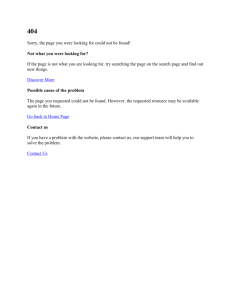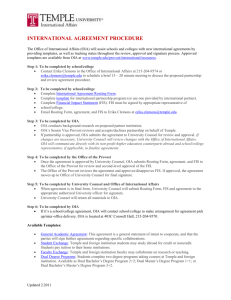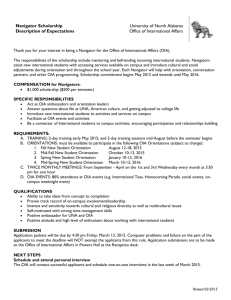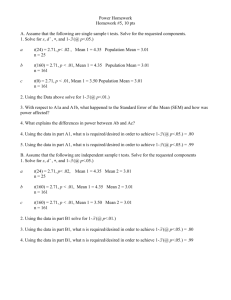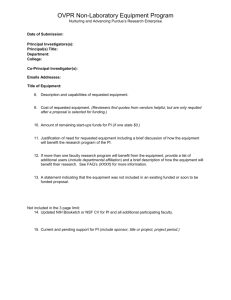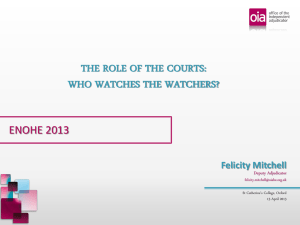DOC - Office of the Ombudsman
advertisement
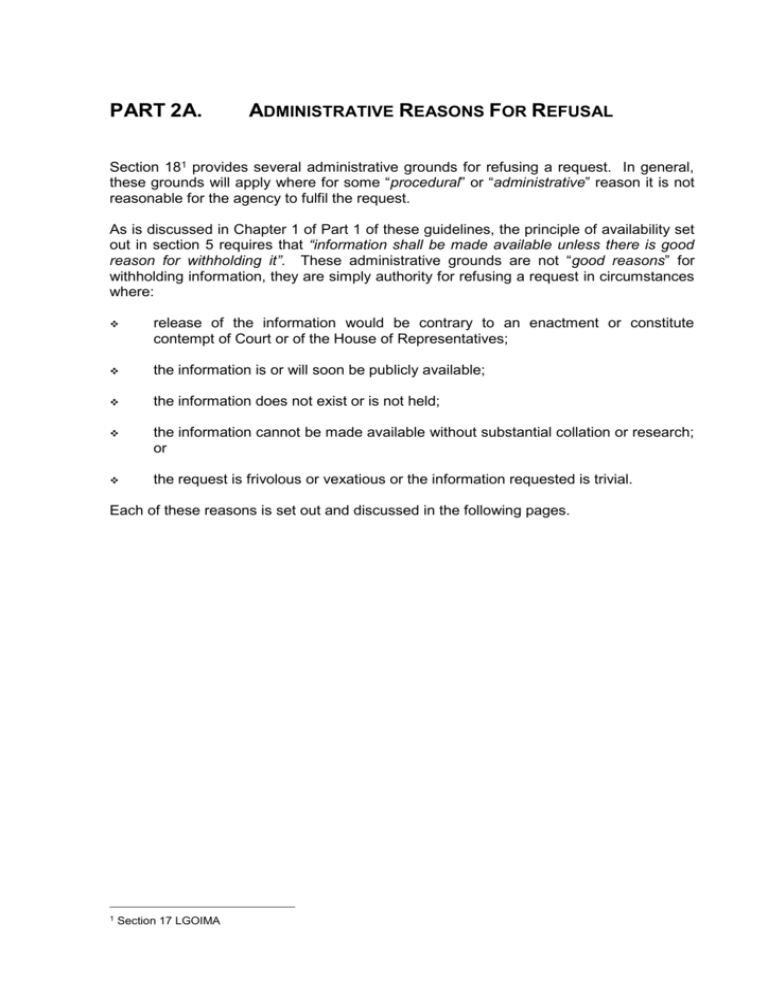
PART 2A. ADMINISTRATIVE REASONS FOR REFUSAL Section 181 provides several administrative grounds for refusing a request. In general, these grounds will apply where for some “procedural” or “administrative” reason it is not reasonable for the agency to fulfil the request. As is discussed in Chapter 1 of Part 1 of these guidelines, the principle of availability set out in section 5 requires that “information shall be made available unless there is good reason for withholding it”. These administrative grounds are not “good reasons” for withholding information, they are simply authority for refusing a request in circumstances where: release of the information would be contrary to an enactment or constitute contempt of Court or of the House of Representatives; the information is or will soon be publicly available; the information does not exist or is not held; the information cannot be made available without substantial collation or research; or the request is frivolous or vexatious or the information requested is trivial. Each of these reasons is set out and discussed in the following pages. 1 Section 17 LGOIMA -2- Part 2A CONTRARY TO AN ENACTMENT, CONTEMPT OF THE HOUSE OF REPRESENTATIVES Section 18(c)2 of the (OIA) provides that a request may be refused if: “… the making available of the information requested would – (i) Be contrary to the provisions of a specified enactment; or (ii) Constitute contempt of Court or of the House of Representatives.” Each of these provisions are discussed on the following pages. Contrary to the Provisions of a Specified Enactment While for the most part requests for information must be considered within the terms of the OIA, there are a number of other provisions in various pieces of legislation which control whether and how certain information should be released. Such provisions usually relate to very specific types of information, or information provided in specific circumstances. Where release of certain information would be contrary to the provisions of such an enactment, a request for that information may be refused pursuant to section 18(c)(i) 3 of the OIA. Relying on section 18(c)(i) When considering whether or not a request should be refused under section 18(c)(i) of the OIA, the agency should carefully consider the specific provision of the enactment being relied upon: (a) Would release of the information requested be “contrary” to this provision? If so, does this provision apply to all the information requested – if it does not, can some of the information be considered for release under the OIA? (b) Does the provision confer any discretion as to whether the information can be released in the circumstances of this case? If so, would it be appropriate to exercise that discretion in the circumstances of this particular case? Examples One provision which is frequently encountered by the Ombudsmen is section 81 of the Tax Administration Act 1994. In particular it requires that, subject to certain limited exceptions, the Inland Revenue Department must maintain secrecy with regard to taxation matters. The fact that section 81 of the Tax Administration Act controls the availability of information about taxation matters means that the OIA does not apply. 2 3 Section 17(c) LGOIMA Section 17(c)(i) LGOIMA -3- Part 2A Release of such information in terms of the OIA would be contrary to section 81, and as such a request for that information could be refused under section 18(c)(i). However, where a person has made a request for information about his or her own personal taxation matters, the Commissioner of Inland Revenue has a discretion to release that information if the Commissioner: is satisfied that the information is readily available in the Department; and considers it reasonable and practicable to give that information. Contempt of Court or of the House of Representatives If releasing the requested information would constitute contempt of Court or contempt of the House of Representatives, that request “may” be refused under section 18(c)(ii)4 of the Act. Section 52(1)5 of the Act also provides that: “Nothing in this Act authorises or permits the making available of any official information if the making available of that information would constitute contempt of Court or of the House of Representatives.” While the use of the word “may” in section 18(c)(ii) suggests that a decision to refuse a request under that section is discretionary, section 52(1) of the Act confirms that the OIA does not provide authority or permission to release information if such disclosure would constitute contempt of Court or of the House of Representatives. Contempt of Court Contempt of Court exists to:6 “… preserve an efficient and impartial system of justice and public confidence in it, by dealing with challenges to the fundamental supremacy of the law”. It may consist of:7 words or acts obstructing, or tending to obstruct or interfere with, the administration of justice; or disobedience of the judgments, orders or other processes of the Court. The OIA allows an agency to refuse a request for information if the release of that information would constitute contempt of Court. 4 Section 17(c)(ii) LGOIMA Section 44(1) LGOIMA which reads “Nothing in Parts I to V of this Act authorises or permits the making available of any official information if that information would constitute contempt of Court or of the House of Representatives” 6 “Contempt of Court” Volume 7, paragraph 5, page 4 “The Laws of New Zealand” (Butterworths, Wellington, June 2001 7 Above n 6 5 -4- Part 2A Relying on section 18(c)(ii) Set out below are the questions that the agency should be able to answer before deciding to refuse a request on the basis that release of the information would constitute contempt of Court: (a) In what way would release of this information constitute contempt of Court? For example, would it breach an order made by the Court? (b) Would release of all of the information constitute contempt of Court? That is, is there any information encompassed by the request which can be released without being in contempt of Court? If so, that information should be considered for release under the OIA. Examples Section 18(c)(ii) of the OIA has been found to apply where: the information requested is the subject of a permanent suppression order by the Court; and a Coroner has prohibited the publication of evidence given at an inquest. Contempt of the House of Representatives In Erskine May’s “Parliamentary Practice”,8 contempt of the House of Representatives is described in the following manner:9 “Generally speaking, any act or omission which obstructs or impedes either House of Parliament in the performance of its functions, or which obstructs or impedes any Member or officer of such House in the discharge of his duty, or which has a tendency, directly or indirectly, to produce such results may be treated as a contempt even though there is no precedent of the offence.” This has been codified in the Standing Orders of the House of Representatives.10 Standing Order 396 states that: “The House may treat as a contempt any act or omission which – (a) obstructs or impedes the House in the performance of its functions, or (b) obstructs or impedes any member or officer of the House in the discharge of the member’s or officer’s duty, or (c) has a tendency, directly or indirectly, to produce such a result.” “Erskine May’s Treatise on The Law, Privileges, Proceedings and Use of Parliament” (21st Edition, Butterworths, London 1989) 9 Above n8, 115 10 (1999) 8 -5- Part 2A If release of official information would constitute contempt of the House of Representatives, a request for that information may be refused under section 18(c)(ii) of the OIA. Relying on section 18(c)(ii) The agency should consider the following questions before deciding whether to refuse a request under section 18(c)(ii) of the Act: (a) In what way would release of the information requested constitute contempt of the House of Representatives? Can a specific Standing Order defining the contempt11 or an established form of contempt12 be pointed to? (b) Would release of all of the information constitute contempt of the House of Representatives? That is, is there any information encompassed by the request which can be released without being in contempt? If so, that information should be considered for release under the OIA. Examples Some examples of what constitutes contempt of the House of Representatives are set out in Standing Orders 397-400 and are discussed in more detail in the book “Parliamentary Practice in New Zealand” by David McGee.13 One example of where section 18(c)(ii) of the OIA might apply is found where, in accordance with Standing Order 219, a select committee has declared evidence to be secret evidence. Disclosure of that secret evidence without authorisation by the House of Representatives may constitute contempt of the House.14 11 See for example Standing Order 397 Established forms of contempt are discussed in David McGee “Parliamentary Practice in New Zealand” (2nd edition, GP Publications, Wellington, 1994) 488 – 498 13 Above n12 14 See Standing Order 397(m); “Parliamentary Practice in New Zealand” above n12, 483, 489, 493 12 Part 2A -6- INFORMATION IS OR WILL SOON BE PUBLICLY AVAILABLE If information is already publicly available, or actions are currently being taken which will mean that the information will “soon” be publicly available, then a request for that information may be refused under section 18(d)15 of the Act. Information that is Publicly Available This section may be applicable if, for example, the information requested is contained in a readily available publication. If this is the case, however, it is reasonable for the agency to also provide advice to the requester as to where and how the information can be obtained. It should not be assumed that the requester will know this. It should also be noted that section 18(d) is expressed in permissive language – it provides that a request “may” be refused if the information requested is publicly available. When considering whether to refuse a request for this reason, the agency should consider whether that information is easily accessible and what the cost of obtaining that information might be. Information that will soon be Publicly Available Section 18(d) also allows an agency to refuse a request on the basis that the information will soon be publicly available. This can encompass situations such as when the information is contained in the text of a speech that is about to be delivered or it is in a report which is being printed and there are difficulties in providing it immediately. It would be administratively impractical for an agency to be expected to provide a copy of the information in these circumstances. As to what is meant by “soon” in the context of section 18(d), this is a question of fact to be determined in the circumstances of the case. The section presupposes, however, an element of certainty about when the information will become publicly available. In these circumstances, it is good practice to provide the requester with a specific date of release or to explain the perceived difficulty in meeting the request immediately. Section 18(d) should not be relied upon if to do so would undermine the purposes of the OIA. Those purposes are set out in section 4.16 For example, it should not be used to delay the release of information which is intended to be incorporated in other material which, although to be made public at a later date, may still require the making of other policy decisions. 15 16 Section 17(d) LGOIMA Section 4 LGOIMA -7- Part 2A THE DOCUMENT DOES NOT EXIST OR CANNOT BE FOUND, OR THE INFORMATION IS NOT HELD Section 18(e)17 of the Act provides that a request may be refused if: “the document alleged to contain the information requested does not exist or cannot be found”; while section 18(g)18 provides that a request may be refused if: “the information requested is not held by the Department or Minister of the Crown or organisation and the person dealing with the request has no grounds for believing that the information is either – (i) Held by another Department or Minister of the Crown or organisation or a local authority; or (ii) Connected more closely with the functions of another Department or Minister of the Crown or organisation or of a local authority”. While these two provisions seem similar - as they both provide for the refusal of a request if the agency simply cannot provide the information because it is not held or it does not exist - there is a subtle distinction. The document does not exist or cannot be found This section is relevant where a requester has sought information contained in a specified 'document'. If that document simply does not exist, or the agency is unable to find the document after a reasonable effort has been made to locate it, a request for this document may be refused. There may be cases, however, where due to insufficient knowledge a requester has been unable to correctly name the document which he or she is actually seeking. In such cases it may be reasonable for the agency to clarify the request with the requester by identifying the documents that do actually exist. This is consistent with the duty of assistance set out in section 1319 of the OIA.20 The agency should consider the following questions before deciding whether to refuse a request under section 18(e) of the Act: (a) (b) 17 Have reasonable steps been taken to confirm that either: (i) the document does not exist; or (ii) the document cannot be found? If the document does not exist, would it be reasonable to contact the requester in order to ascertain the requester’s area of interest and to confirm whether any other information exists which may satisfy the request? Section 17(e) LGOIMA Section 17(g) LGOIMA 19 Section 11 LGOIMA 20 The duty of assistance is discussed in more detail in chapter 2 of Part A of these guidelines 18 -8- Part 2A The information is not held There are two elements in section 18(g) which must be established before it can be relied upon to refuse a request. The first element to be established is that the “information” requested is not held by the agency to whom the request is made. Once the agency is satisfied that it does not hold the information, the person dealing with the request must consider whether: (i) the information requested is held by another Department, Minister of the Crown, organisation or local authority; or (ii) the information requested is connected more closely with the functions of another Department, Minister of the Crown, organisation or local authority. If the person dealing with the request has no grounds for believing that either (i) or (ii) above apply, then the request may be refused under section 18(g) of the OIA. If, however, the person dealing with the request does have grounds for believing that another agency may hold the requested information, or that the information is more closely connected to the functions of another agency, then the request should be transferred in accordance with section 1421 of the OIA.22 21 22 Section 12 LGOIMA For a more detailed discussion of transferring an OIA request, see chapter 2 of Part A of these guidelines -9- Part 2A SUBSTANTIAL COLLATION OR RESEARCH Section 18(f)23 of the OIA allows a request to be refused on the basis that: “… the information requested cannot be made available without substantial collation or research.” The OIA does not bar a requester from seeking a large amount of information or from defining the parameters of a particular request in broad terms. However, although the Act does not expressly preclude “fishing expeditions”, the Danks Committee commented that:24 “It is not envisaged that individuals should have a right to conduct ‘fishing expeditions’ in the hope or expectation that material of interest or use will turn up or make vague or sweeping requests for a class of information.” Section 18(f) of the Act allows a request to be refused if other mechanisms in the legislation do not provide a reasonable basis for managing the administrative burden of processing a large or broadly defined request. This approach has been confirmed by recent amendments to the OIA.25 What is “substantial collation and research”? The following factors have been identified as relevant when assessing whether meeting a particular request would involve “substantial collation and research” in terms of section 18(f): (i) the amount of work involved in determining what information falls within the scope of the request; (ii) the difficulty involved in locating, researching or collating the information; (iii) the amount of documentation to be looked at; (iv) the work time involved; (v) the nature of the resources and the personnel available to process requests for information and (vi) the effect on other operations of the diversion of resources to meet the request. When should section 18(f) be relied upon? In its “Review of the Official Information Act 1982”, the Law Commission stated that:26 “Agencies familiar with the scheme of the Act should already regard s.18(f) as a provision of last resort, which must be considered in the light of the 23 24 Section 17(f) LGOIMA “Towards Open Government”, Supplementary Report, 1981, 69 25 Sections 18A and B OIA; sections 17A and B LGOIMA 26 (NZLC R40, Wellington, 1997) paragraph 100, page 43 - 10 - Part 2A obligation in s.13 to help requesters with the ‘due particularity’ requirement, and the Act’s charging and extension provisions.” The Act provides statutory mechanisms to assist the management of large and broadly defined requests by: (a) encouraging early identification of the specific information that the requester is seeking;27 (b) promoting communication between the organisation receiving the request and the requester to assist the identification process;28 (c) providing incentives for requesters to keep requests within reasonable administrative requirements or risk: reasonable extension of the time limit for consideration of the request;29 reasonable charges for making available the information requested;30 alternative forms of disclosure under section 1631 (release of summaries or extracts, oral briefings) which may avoid the need to peruse large volumes of information. If none of these mechanisms provide a reasonable basis for managing the administrative burden of processing a large or broadly defined request in a particular case, then refusal under section 18(f) may be justified. This approach has been confirmed by recent amendments to the OIA, which read: 32 “18A Requests involving substantial collation and research (1) (2) In deciding whether to refuse a request under section 18(f), the Department, Minister of the Crown, or organisation must consider whether doing either or both of the following would enable the request to be granted: (a) fixing a charge under section 15: (b) extending the time limit under section 15A…. For the purposes of refusing a request under section 18(f), the Department, Minister of the Crown, or organisation may treat as a single request 2 or more requests from the same person— (a) that are about the same subject matter or about similar subject matters; and (b) that are received simultaneously or in short succession. 27 Section 12(2) OIA; section 10(2) LGOIMA Section 13 OIA; section 11 LGOIMA 29 Section 15A OIA; section 14 LGOIMA 30 Section 15 OIA; section 13 LGOIMA 31 Section 15 LGOIMA 28 32 Sections 17A and B LGOIMA Part 2A - 11 - 18B Duty to consider consulting person if request likely to be refused under section 18(e) or (f) If a request is likely to be refused under section 18(e) or (f), the Department, Minister of the Crown, or organisation must, before that request is refused, consider whether consulting with the person who made the request would assist that person to make the request in a form that would remove the reason for the refusal.” Accordingly, before deciding whether section 18(f) of the OIA provides grounds to refuse a request, agencies must first consider: imposing a charge for the supply of the information at issue or extending the time frame for responding to the request would enable the request to be granted; and consulting with the requester would assist the requester to make their request in a manner which would not involve substantial collation and research. In addition, if a requester makes more than one request on the same, or similar, topics simultaneously or in short succession, those requests may now be treated as one for the purposes of section 18(f) of the OIA. - 12 - Part 2A FRIVOLOUS AND VEXATIOUS REQUESTS, REQUESTS FOR TRIVIAL INFORMATION Section 18(h)33 of the OIA provides that a request may be refused if: “… the request is frivolous or vexatious or that the information requested is trivial.” It contemplates the refusal of a request in two different contexts: (i) the request, irrespective of the nature of the information requested, is frivolous or vexatious; or (ii) the information requested is trivial. Each of these contexts is discussed below. The request is frivolous or vexatious What does “frivolous or vexatious” mean? The expression “frivolous or vexatious” has a long legal background in the context of striking out proceedings. A Court’s power to strike out proceedings on these grounds is discretionary, and it is a discretion that is not lightly exercised. The Ombudsmen have followed the interpretation that the Courts have taken when considering whether a request is “frivolous or vexatious”. In this context, the Courts have considered that: to be “frivolous”, pleadings must be so clearly frivolous that to put them forward would be an abuse of the process of Court;34 and to be “vexatious”, the claim must be such that no reasonable person could properly treat it as bona fide (that is, having been made in good faith).35 In terms of the OIA, therefore, for a request to be refused on the grounds that it is “frivolous” or “vexatious” a requester must be believed to be patently abusing the rights granted by the legislation for access to information, rather than exercising those rights in good faith. Is the “request” frivolous or vexatious? It is important to note that a distinction needs to be drawn between requests that are considered to be “frivolous or vexatious” and requesters who are considered to be so. The Act does not permit requests to be refused simply on the grounds that a requester has already made numerous, possibly time consuming requests which, in the eyes of the organisation dealing with the requester, appear to serve no practical purpose. It is not 33 Section 17(h) LGOIMA Young v Holloway [1895] P 87 35 Norman v Matthews [1916 – 1917] All ER 696. Other relevant cases are Re Vernazza [1960] 1 All ER 183 and Riches v DPP [1973] 2 All ER 935. Many of the authorities are collected in A-G v Hill (1993) 7 PRNZ 20. 34 - 13 - Part 2A the identity of the requester that determines whether a request is frivolous or vexatious”, but the nature of the request made in light of the surrounding circumstances. 36 However, the conduct of the requester and the purpose of the request may well be relevant to the question of whether a request by that person is “frivolous or vexatious”. Past experience may well indicate that a new request is simply an abuse of the official information rights rather than a request for information made in good faith, and therefore it is “frivolous or vexatious”. That is a judgment that must be made having regard to past dealings with that requester, but having had vexatious requests from a particular individual in the past is not of itself sufficient to conclude that a new request is also automatically vexatious. The Danks Committee, in its Supplementary Report, commented with regard to this provision that:37 “It seems plainly wrong that an unbalanced, mischievous or malicious individual should be able to inundate a department with time-wasting requests.” It did not, however, suggest that any person should be denied the opportunity to make a genuine request, or that organisations should be able to differentiate between requests on the basis of the identity of the requester. Rather, it appears to have been the intention that requests seen to be of a time wasting nature (that is, made for irrational, mischievous or malicious purposes) should be able to be refused on the grounds that the requests (not the requester), were “frivolous or vexatious”. The information requested is trivial The question of whether the information is trivial is a judgment to be made taking into account the circumstances of a particular case. Information which may appear trivial to an agency, may be particularly relevant to the purpose for which a requester is seeking information. Some relevant factors to consider include: the nature of the information; the purpose for which the information is requested; and the connection between the information requested and any information that is already in the public domain This issue often arises where widely-framed requests have been made for all information in relation to a particular subject. Such requests will often cover trivial information which refers to the subject matter. A common example is an e-mail which refers to the subject in the context of making administrative arrangements for a meeting – for example: 36 In this respect the legislation differs from the position under section 88A of the Judicature Act 1908, which empowers the High Court to order persons who have “persistently and without any reasonable ground instituted vexatious legal proceedings” from bringing further civil proceedings without leave of the Court. There is no provision in the official information legislation that authorises requesters to be dealt with as vexatious requesters. Rather, the official information legislation is more akin to the situation under Rule 477 of the High Court Rules or Rule 481 of the District Court Rules which authorise proceedings to be struck out on the grounds that those proceedings, not the litigant, are “frivolous or vexatious”. 37 “Towards Open Government”, Supplementary Report, 1981, paragraph 4.38(2), page 31 - 14 - Part 2A “Re: [subject matter] Shall we meet at 3 pm. and walk over to the Minister’s office for our 3:15 meeting with [relevant persons]?” If the purpose of the request is to obtain information which reflects the manner in which a particular policy has been developed, the type of information referred to above could be considered 'trivial'. To the extent that the request includes such information it might be refused in reliance upon section 18(h). If, however, the purpose of the request was to determine who was involved in the development of the policy under consideration, then such information might be relevant. A refusal in terms of section 18(h) might not be justified in such circumstances.

